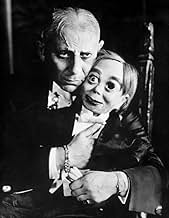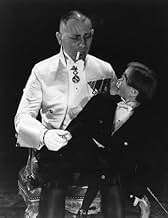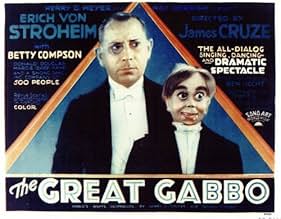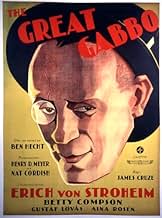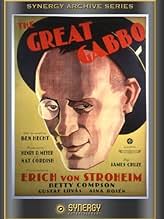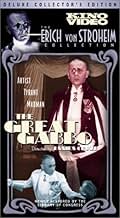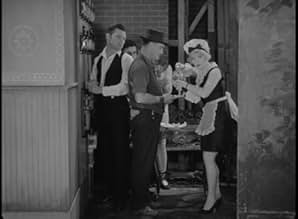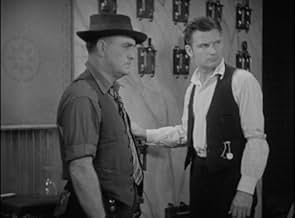NOTE IMDb
6,0/10
1 k
MA NOTE
Ajouter une intrigue dans votre langueAn insanely, egocentric ventriloquist, even though he is possessed by his wooden dummy, is in love with a dancer who is in love with another. The dummy gives advice to the ventriloquist.An insanely, egocentric ventriloquist, even though he is possessed by his wooden dummy, is in love with a dancer who is in love with another. The dummy gives advice to the ventriloquist.An insanely, egocentric ventriloquist, even though he is possessed by his wooden dummy, is in love with a dancer who is in love with another. The dummy gives advice to the ventriloquist.
Erich von Stroheim
- The Great Gabbo
- (as Eric Von Stroheim)
Marjorie Kane
- Babe
- (as Margie 'Babe' Kane)
George Grandee
- Otto
- (voix)
- (non crédité)
Bo Peep Karlin
- Dancer
- (non crédité)
Rosina Lawrence
- Dancer
- (non crédité)
Harry Ross
- Performer
- (non crédité)
Eddy Waller
- Vaudevillian
- (non crédité)
Marbeth Wright
- Dancer
- (non crédité)
Histoire
Le saviez-vous
- AnecdotesThe dummy Otto was a hand carved basswood Frank Marshall figure. The same man who designed Edgar Bergen's famous characters Charlie McCarthy and Mortimer Snerd.
- GaffesThe dancers doubling for Betty Compson and Donald Douglas during the acrobatic sequences of "Web of Love" don't match up with them physically. Compson's double is younger and slimmer, while Douglas's double is beefier, especially in the legs.
- Versions alternativesGabbo le ventriloque (1929) was originally released by Sono Art-World Wide Pictures, with certain sequences were presented in Multicolor. However, current prints, restored by the Library of Congress and released by Kino International on DVD, exist only in black-and-white. Most, perhaps all, VHS and DVD releases of the film have the color sequences in black and white.
- ConnexionsEdited into The Girl from Calgary (1932)
- Bandes originalesEvery Now and Then
(uncredited)
Written by King Zany and Donald McNamee
Performed by Marjorie Kane and Donald Douglas
Commentaire à la une
If there ever was any schizophrenic example of musicals then that would be 'The Great Gabbo'. This is disturbing psychological drama interrupted by lavish and wonderful dance and music numbers. James Cruze is credited as a director but to be honest most of the non-musical scenes have von Stroheim all written over them. And not only because von Stroheim played in them but there is some sort of very specific psychologically tense atmosphere in them. It is unknown to me how much control von Stroheim had over the production but it is clear (to everyone familiar with von Stroheim's work) that he at least gave some instructions.
The film is much more than just a curiosity - two seemingly different movies, a psychological drama, and a musical tied together. Erich von Stroheim brilliantly plays brilliant ventriloquist Gabbo who is mad or driven mad by his art. When we first meet Gabbo on the screen, we see an unpleasant cruel man who in his egocentrism and perfectionism blames everyone else for his failures. After his lover and partner Mary (Betty Compson) drops the tray in the middle of the performance, he accuses her again. She leaves her but not with a light heart. Pass the two years and they both have worked their way up into Broadway. They meet again when they both appear in the same review show.
The dramatic parts concentrating on Gabbo and his relationships with other people are good but quite poorly developed. Probably because of the forceful inclusion of the musical numbers that do nothing to forward the story or even add anything to it. And this is crystal clear while watching the movie. These would have worked in a lesser amount as just a backdrop for the story. Although, I have to say the musical numbers were interesting to watch but that was the wrong movie for them. The dramatic parts are heavy and the sudden transition into the musical numbers puts the viewer off. Although the musical numbers separately are interesting I found them distracting and thus it made it difficult to follow the story.
Although the movie is inconsistent and didn't quite work, it is still worth watching especially for its uniqueness in the musical category.
The film is much more than just a curiosity - two seemingly different movies, a psychological drama, and a musical tied together. Erich von Stroheim brilliantly plays brilliant ventriloquist Gabbo who is mad or driven mad by his art. When we first meet Gabbo on the screen, we see an unpleasant cruel man who in his egocentrism and perfectionism blames everyone else for his failures. After his lover and partner Mary (Betty Compson) drops the tray in the middle of the performance, he accuses her again. She leaves her but not with a light heart. Pass the two years and they both have worked their way up into Broadway. They meet again when they both appear in the same review show.
The dramatic parts concentrating on Gabbo and his relationships with other people are good but quite poorly developed. Probably because of the forceful inclusion of the musical numbers that do nothing to forward the story or even add anything to it. And this is crystal clear while watching the movie. These would have worked in a lesser amount as just a backdrop for the story. Although, I have to say the musical numbers were interesting to watch but that was the wrong movie for them. The dramatic parts are heavy and the sudden transition into the musical numbers puts the viewer off. Although the musical numbers separately are interesting I found them distracting and thus it made it difficult to follow the story.
Although the movie is inconsistent and didn't quite work, it is still worth watching especially for its uniqueness in the musical category.
Meilleurs choix
Connectez-vous pour évaluer et suivre la liste de favoris afin de recevoir des recommandations personnalisées
Détails
- Date de sortie
- Pays d’origine
- Langues
- Aussi connu sous le nom de
- The Great Gabbo
- Lieux de tournage
- Société de production
- Voir plus de crédits d'entreprise sur IMDbPro
- Durée1 heure 32 minutes
- Couleur
Contribuer à cette page
Suggérer une modification ou ajouter du contenu manquant

Lacune principale
By what name was Gabbo le ventriloque (1929) officially released in Canada in English?
Répondre
